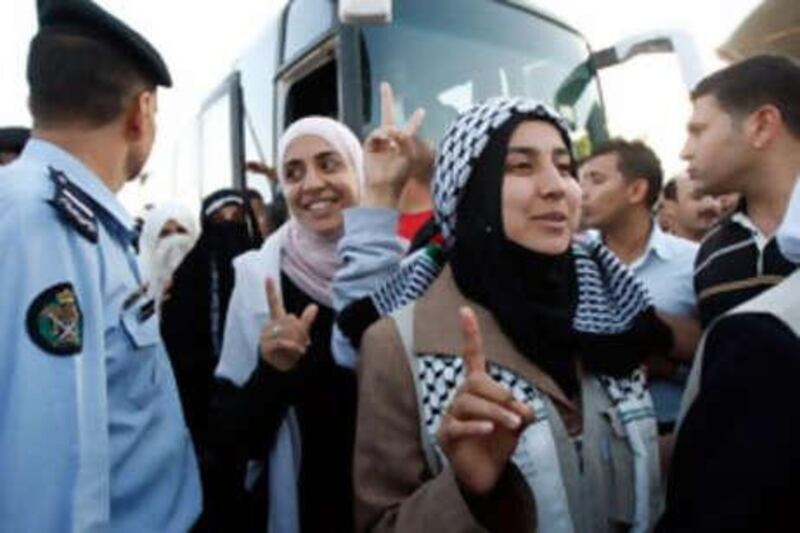NAZARETH // Israel yesterday worked to fast-track the release of hundreds of foreign peace activists arrested in its raid on a Gaza-bound aid flotilla earlier this week. A steady flow of buses ferried detainees to land borders and the main airport.
Israel said all 680 detainees would be released yesterday after a heated debate among government ministers on Tuesday night at which most agreed it was important to minimise the damage to Israel's severely battered image. Israeli human rights groups accused the government of carrying out the repatriations amid great secrecy, saying they believed about 50 activists, some of them severely injured, were still being held incommunicado.
There were also reports that dozens of detainees who had been taken to the airport were refusing to board planes home last night as they sought to contest the Israeli action in the courts. Israel Radio reported that violent scuffles had broken out between some of the activists and immigration officials. Lawyers who tried to meet the detainees yesterday at Ela prison in the desert city of Beersheba were denied access. On Tuesday nine lawyers were given 90 minutes with 240 detainees but complained that they had not had enough time to get proper testimonies.
Lawyers faced similar problems trying to visit medical facilities where the wounded are being held. One Arab community leader was arrested yesterday when he tried to visit injured detainees. The government reported last night that there were 41 injured activists still being held. Human rights groups said they were particularly keen to track down the whereabouts of several Palestinians from Gaza, the West Bank and East Jerusalem known to have been on board the flotilla but of whom there were no records showing they had been released.
Israeli prosecutors also refused to release four Israeli citizens, all members of the country's Palestinian minority. They were remanded until next week in a move lawyers criticised as "selective prosecution". "Israel has carried on as though it does not need to recognise the legal rights of the detainees," said Sawsan Zaher, a lawyer with the Adalah legal centre, which has been trying to get testimonies from the detainees.
"They have been denied legal representation, their rights have not been explained to them, we have not been able to take proper affadavits, and they have been made to sign documents in Hebrew they do not understand." The rapid about-turn in Israel's position on releasing the detainees came after officials had claimed that at least 100 members of the flotilla from Turkey, Yemen, and Indonesia were linked to global extremist movements.
On Tuesday night, Aharon Leshno Yaar, Israel's ambassador in Geneva, told the United Nations Human Rights Council that the attack on the Israeli commandos was "premeditated" and that activists recruited by the Turkish organisers belonged to terror organisations. But at the cabinet meeting a majoriy of ministers supported releasing the activists, although it was agreed that any passengers who could be identified on video footage attacking Israeli soldiers would be remanded.
An initial 45 were released on Tuesday, after which another group of 120 detainees, mostly from Muslim nations without diplomatic ties to Israel, left across the Allenby Bridge land crossing into Jordan. Buses ferried hundreds of other activists from Beersheba to Israel's airport near Tel Aviv yesterday. Turkey, which had the largest number of nationals on the flotilla, at 380, sent three planes to fly them back.
By late yesterday afternoon Israel claimed all the activists were in the process of being sent home. Human rights groups, however, pointed out that many of the wounded were still in Israeli hopsitals. Jafar Farah, the director of Mossawa, an Arab advocacy group in Israel, was arrested by police at Rambam Hospital in Haifa after he insisted on visiting injured detainees. A spokeswoman for Physicians for Human Rights-Israel said they had been denied the right to see either the wounded or the bodies of the nine activists reported to have been killed. They appealed to the courts yesterday to be given access.
The International Red Cross was reported to have been allowed access to the wounded passengers but was unavailable for comment. The Adalah legal centre said the continuing detentions of four Palestinian leaders in Israel amounted "to selective prosecution due solely to their national belonging. They are not being detained because of their Israeli citizenship but because they are Palestinian Arab citizens of Israel".
The four, who have not yet been indicted, are being investigated for crimes such as conspiracy to commit an offence and possession and use of weapons. They include Raed Salah and Hamad Abu Daabes, leaders of the two branches of Israel's Islamic Movement, and Mohammed Zeidan, the head of the High Follow-Up Committee, the main political body for the Palestinian minority. If prosecuted, their cases could become the first tests in Israel of the legality of the raid on the flotilla, as Adalah said it would argue that the Israeli courts had no jurisdiction in the case because the four were arrested in international waters.
In an acrimonious debate in the parliament yesterday, Miri Regev of the prime minister Benjamin Netanyahu's ruling Likud party, called the Arab MP Haneen Zoubi, who was on the flotilla, a "Trojan horse" and shouted: "Go to Gaza, traitor." Adalah has warned that the rapid and enforced dispersal of the detainees to nearly 40 different countries before lawyers have been able to collect proper witness testimonies would hamper the credibility of subsequent investigation or prosecutions, either inside Israel or at international tribunals.
There were angry demonstrations at several Israeli universities yesterday, with Arab and left-wing Jewish protesters facing off against right-wing students who noisily supported the commando raid. @Email:foreign.desk@thenational.ae






